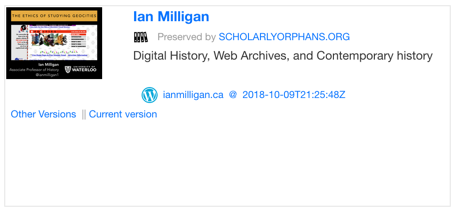Join GitHub today
GitHub is home to over 36 million developers working together to host and review code, manage projects, and build software together.
Sign upparsing multiple Link: response headers #136
Comments
This comment has been minimized.
This comment has been minimized.
|
Thanks for this. MementoEmbed uses the MementoEmbed/mementoembed/mementoresource.py Lines 103 to 115 in 1246756 The problem exists in the function All examples in RFC 8288 - Web Linking use quotes, but section 3 states:
and
So, MementoEmbed needs to support both. I have discovered a possible solution. The |

phonedude commentedOct 11, 2018
Martin brought this to my attention. Here's a sample URL:
https://scholarlyorphans.org/memento/20181009212548/https://ianmilligan.ca/
and it returns two different Link headers:
$ curl -IL https://scholarlyorphans.org/memento/20181009212548/https://ianmilligan.ca/
HTTP/1.1 200 OK
Server: nginx/1.12.1
Content-Type: text/html; charset=UTF-8
Connection: keep-alive
X-Archive-Orig-Server: nginx
Date: Tue, 09 Oct 2018 21:25:48 GMT
X-Archive-Orig-Transfer-Encoding: chunked
X-Archive-Orig-Connection: keep-alive
X-Archive-Orig-Strict-Transport-Security: max-age=86400
X-Archive-Orig-Vary: Accept-Encoding
X-Archive-Orig-Vary: Cookie
X-hacker: If you're reading this, you should visit automattic.com/jobs and apply to join the fun, mention this header.
Link: https://wp.me/4cEB; rel=shortlink
X-Archive-Orig-Content-Encoding: gzip
X-ac: 3.sea _bur
Memento-Datetime: Tue, 09 Oct 2018 21:25:48 GMT
Link: https://ianmilligan.ca/; rel="original", https://scholarlyorphans.org/memento/https://ianmilligan.ca/; rel="timegate", https://scholarlyorphans.org/memento/timemap/link/https://ianmilligan.ca/; rel="timemap"; type="application/link-format", https://scholarlyorphans.org/memento/20181009212548/https://ianmilligan.ca/; rel="memento"; datetime="Tue, 09 Oct 2018 21:25:48 GMT"; collection="memento"
Content-Location: https://scholarlyorphans.org/memento/20181009212548/https://ianmilligan.ca/
Content-Security-Policy: default-src 'unsafe-eval' 'unsafe-inline' 'self' data: blob: mediastream: ws: wss: ; form-action 'self'
Now, the first header is in error (it should be in X-Archive-orig-Link), but multiple Link headers are allowed as per RFC 2616 (and 7230). Martin said MementoEmbed wasn't finding link rel="original", probably bc it occurs in the 2nd Link header and not the first.